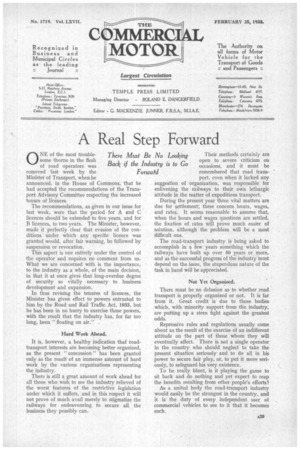A Real Step Forward
Page 31

If you've noticed an error in this article please click here to report it so we can fix it.
0 NE of the most troublesome thorns in the flesh of road operators was removed last week by the Minister of Transport, when he announced, in the House of Commons, that he had accepted the recommendations of the Transport Advisory Committee respecting the increased tenure of licences.
The recommendations, as given in our issue for last week, were that the period for A and C licences should be extended to five years, and for B licences, to two years. The Minister, however, made it perfectly clear that evasion of the conditions under which any specific licence was granted would, after fair warning, be followed by suspension or revocation.
This aspect is one entirely under the control of the operator and requires no comment from us. What we are concerned with is the importance, to the industry as a whole, of the main decision, in that it at once gives that long-overdue degree of security so vitally necessary to business development and expansion.
In thus revising the tenures of licences, the Minister has given effect to powers entrusted to him by the Road and Rail Traffic Act, 1933, but he has been in no hurry to exercise those powers, with the result that the industry has, for far too long, been "floating on air." .
Hard Work Ahead.
It is, however, a healthy indication that' roadtransport interests are becoming better organized, as the present " ooncession " has been granted only as the result of an immense amount of hard work by the various organizations representing the industry.
There is still a great amount of work ahead for all those who wish to see the industry relieved of the worst features of the restrictive legislation under which it suffers, and in this respect it will not prove of much avail merely to stigmatize the railways for endeavouring to secure all the business they possibly can. Their methods certainly are open to severe criticism on occasions, and it must be remembered that road transport, even when it lacked any suggestion of organization, was responsible for enlivening the railways to their own lethargic attitude in the matter of expeditious transport.
During the present year three vital matters are due for settlement; these concern hours, wages, and rates. It seems reasonable to assume that, when the hours and wages questions are settled, the fixation of rates will prove much easier of solution, although the problem will be a most difficult one.
The road-tra.nsport industry is being asked to accomplish in a few years something which the railways have built up over 50 years or more, and as the successful progress of the industry must depend on the issue, the stupendous nature of the task in hand will be appreciated.
Not Yet Organized.
There must be no delusion as to whether road transport is properly organized or not. It is far from it. Great credit is due to those bodies which, with minority support from the industry, are putting up a stern fight against the greatest odds.
Repressive rules and regulations usually come about as the result of the exercise of an indifferent attitude on the part of those whom they will eventually affect. There is not a single operator in the country who should neglect to take the present situation seriously and to do all in his power to secure fair play, or, to put it more seriously, to safeguard his very existence.
To be really blunt, is it playing the game to sit back and do nothing and yet expect to reap the benefits resulting from other people's efforts?
As a united body the road-transport industry would easily be the strongest in the country, and it is the duty of every independent user of commercial vehicles to see to it that it becomes such.
































































































